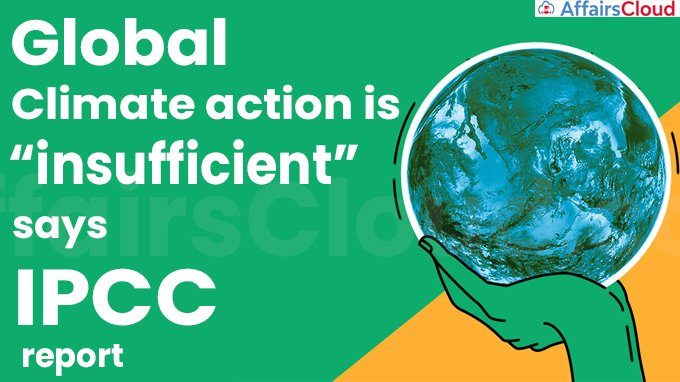
The ‘Synthesis Report (SYR) of the IPCC Sixth Assessment Report (AR6) Climate Change 2023′ (Summary for Policymaker)’ released on March 21, 2023, by the United Nations’ (UN) Intergovernmental Panel on Climate Change (IPCC), underscores the immediate need to take more ambitious climate actions as the current global climate action plans in the last 5 years are not enough i.e. “insufficient” in limiting global warming to 1.5 degrees Celsius (°C) above pre-industrial levels.
- The report summarises the state of knowledge of climate change, its widespread impacts and risks, and climate change mitigation and adaptation.
- The average temperatures had already touched 1.1 °C above the pre-industrial times.
Key Analysis of the Report:
i.Out of the 1.1°C temperature rise, about 1.07 degree Celsius was contributed by human activities.
ii.The cumulative net CO2 emitted by the world from 1850 to 2019 was about 2400±240 GtCO2 (gigatonnes of carbon dioxide), in which 58% (more than half) occurred between 1850 and 1989, and about 42% occurred between 1990 and 2019
iii.The report mentioned the requirment of deep, rapid and sustained greenhouse gas (GHG) emissions reductions in all sectors for keeping warming to 1.5°C above pre-industrial levels.
- It also insists to cut GHG emission by almost half by 2030, if warming is to be limited to 1.5°C.
- Average annual GHG emissions during 2010-2019 were higher than in any previous decade, while the rate of growth between 2010 and 2019 was about 1.3% per year.
iv.Global surface temperature was 1.09°C higher in 2011–2020 than 1850–1900 with larger increases over land (1.59°C ) than over the ocean (0.88°C).
v.Global surface temperature in the first two decades of the 21st century (2001-2020) was 0.99°C higher than 1850-1900.
vi.Almost half of the world’s population lives in regions that are highly vulnerable to climate change.
vii.The last decade, deaths from floods, droughts and storms were 15 times higher in highly vulnerable regions.
Other suggestions:
i.Climate, ecosystems and society are interconnected. Effective and equitable conservation of approximately 30-50% of the Earth’s land, freshwater and ocean will help ensure a healthy planet.
ii.Changes in the food sector, electricity, transport, industry, buildings and land-use can reduce greenhouse gas emissions
iii.The report suggested theInvestors, central banks and financial regulators to increase finance to climate investments to achieve global climate goals.
iv.To have a 50% chance of keeping warming below 1.5 degree Celsius, the report directed the world to not emit more than 500 billion tonnes of CO2 equivalent after 2020.
About the SYR of the IPCC AR6:
i.The IPCC publishes comprehensive scientific assessments every six to seven years. In its Sixth Assessment cycle, the IPCC released the Synthesis Report of AR6, the last of the Sixth Assessment Report products.
ii.The synthesis report is based on the content of the three Working Groups’ (WG) Assessment Reports, WGI: The Physical Science Basis; WGII: Impacts, Adaptation and Vulnerability; and WGIII: Mitigation of Climate Change and the three Special Reports: Global Warming of 1.5°C, Climate Change and Land, The Ocean and Cryosphere in a Changing Climate.
iii.At its 43rd Session in April 2016, the IPCC decided to produce three Special Reports, a Methodology Report and Sixth Assessment Report (AR6).
About Intergovernmental Panel on Climate Change (IPCC):
i.IPCC is the UN body for assessing the science related to climate change. It was established by the United Nations Environmental Programme (UNEP) and the World Meteorological Organization (WMO) in 1988 to provide political leaders with periodic scientific assessments about climate change.
ii.The IPCC has 195 member states that are members of the UN or WMO.
iii.The IPCC has three working groups: WG I, II, III, and it also has a Task Force on Greenhouse Gas Inventories that develops methodologies for measuring emissions and removals.
Chair – Hoesung Lee
Location – Geneva, Switzerland




